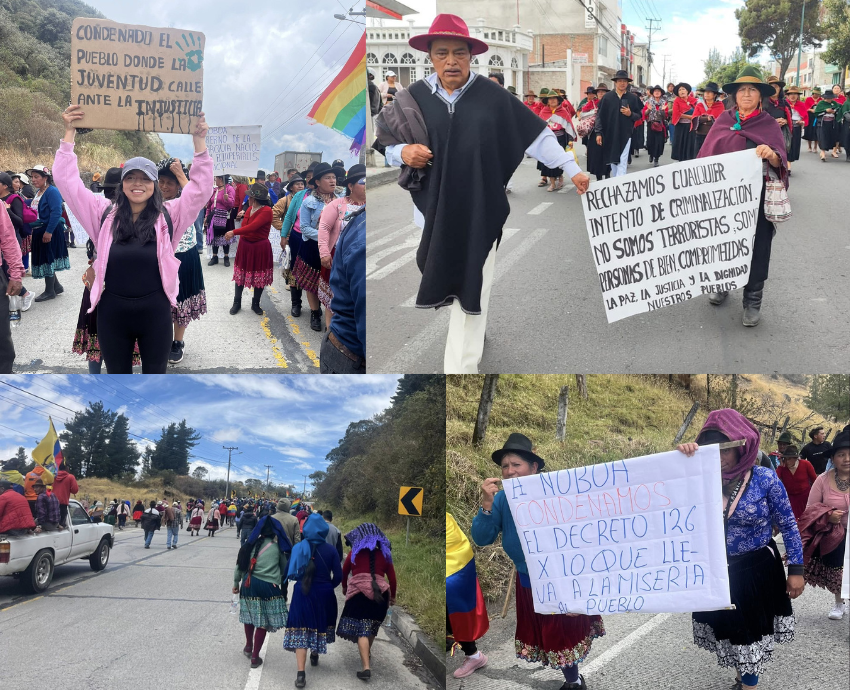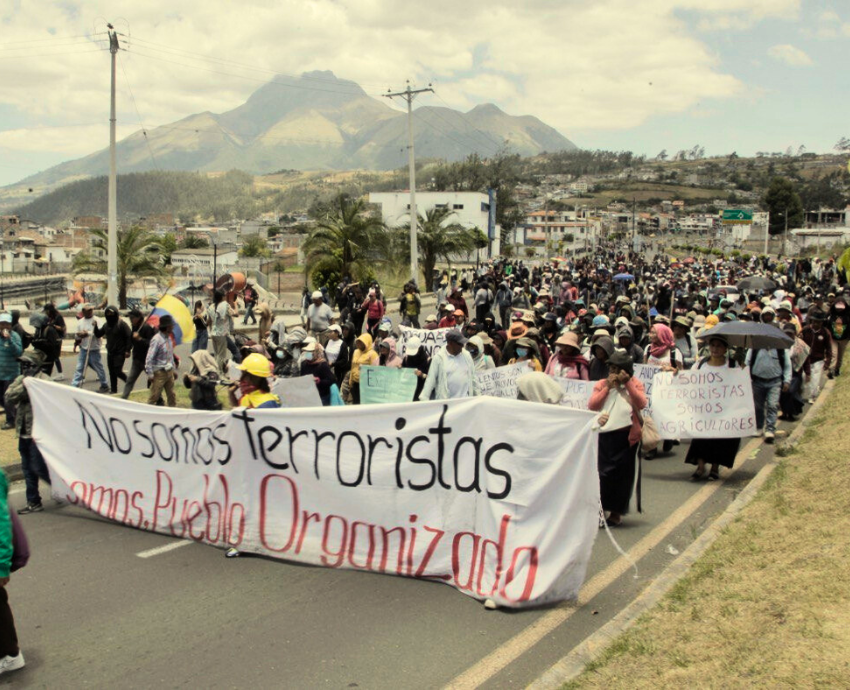
Ecuadorians are resoundingly resisting the Daniel Noboa government’s neoliberal policies, despite heavy police and military repression.
The Confederation of Indigenous Nationalities of Ecuador (CONAIE) — the country’s most powerful social movement — announced an indefinite national strike from September 22. Students, teachers, workers’ unions and environmental defenders have joined nationwide blockades and marches.
The protests were triggered by the recent elimination of the diesel subsidy — which directly impacts food production, transport and construction. However, they are more broadly against the government’s extractive agenda and authoritarianism, a deepening insecurity crisis and rising cost of living.
Specific demands include: the immediate repeal of Decree 126, which eliminated the diesel subsidy; a reduction in the goods and services tax; an end to the extractivist model, with respect for the right to free, prior and informed consent; urgent funding for healthcare and education; and a stop to the repression and persecution of social movements.
Within three days of the strike commencing, protesters had blockaded more than 50 roads, occupied city squares and forced nationwide school closures.
The resource-rich northern province of Imbabura is the focal point of marches and blockades — particularly in the Otavalo and Cotacachi districts — and the target of the heaviest police and military repression.
Shortly before the strike began, Noboa imposed a 60-day curfew in five provinces and a “state of exception” in eight, suspending the right to free assembly and granting police and the army sweeping powers.
Militarisation
The Noboa regime has sent convoys of military trucks to Imbabura during the strike, under the guise of providing “humanitarian aid”, to further militarise the situation and repress local communities. During a convoy deployment on September 28, the military shot and killed Indigenous man Efraín Fuerez in Cotacachi.
Coinciding with military deployments have been electricity and internet blackouts, limiting local communities’ ability to communicate and report on the repression.
Police arbitrarily detained 12 Indigenous Kichwa youth in Otavalo, accused them of “terrorism” and sent them to maximum-security prisons in Esmeraldas and Portoviejo.
In the eastern Amazonian province of Pastaza, Indigenous communities are holding firm against Noboa’s plans to expand the oil frontier by auctioning off “oil blocks” of Indigenous land to mostly foreign multinationals.
Facing the threat of ramped-up oil exploitation, representatives from the seven Indigenous peoples of the Ecuadorian Amazon resolved to declare Pastaza “free from extractivism” in the weeks leading up to the strike. During the first week of the strike, protesters blockaded a section of the region’s main highway.
At least 10 roads are completely closed in the provinces of Azuay, Cañar, Cotopaxi, Imbabura and Pichincha, as of September 30.
In the southern province of Azuay, people have been resisting Noboa’s push to expand large-scale mining. More than 100,000 people marched in Cuenca, on September 16, in rejection of Canadian-based Dundee Precious Metals’ Loma Larga mine. The mine threatens the Quimsacocha highland moors, containing the headwaters of five crucial rivers. Protesters called on the government to respect the results of a 2021 referendum, in which more than 80% of the population in the Cuenca district voted to prohibit mining in the region.
Authoritarianism
Police and military use of live ammunition, teargas and arbitrary detentions have been reported nationwide. More than 100 human rights violations, 48 injuries and 63 arbitrary detentions were recorded by September 28.
The state’s response to the strike further reveals the authoritarian nature of the regime.
The banking regulator, under orders from the government, froze CONAIE’s bank accounts to limit the economic means to sustain the strike.
The government suspended the transmission of TV MICC — the country’s first Indigenous television channel that broadcasts important community news in Kichwa and Spanish — on September 23, citing “national security” concerns.
Government officials have smeared peaceful protesters as belonging to the Tren de Aragua — a Venezuelan criminal organisation — to delegitimise protests and justify unleashing brutal force.
Noboa labelled the blockading of roads as “terrorism” and threatened community defenders with prison sentences of up to 30 years.

Corporate media, which openly support the billionaire oligarch, repeat his unverified false claims and spread disinformation about the largely peaceful protests.
Noboa has also relentlessly exploited, and contributed to, the insecurity crisis to consolidate power.
Since taking office in November 2023, Noboa has mostly ruled under a “state of exception”, which he claims is necessary to combat “organised crime”. In practice, the regime uses its emergency powers to criminalise land defenders and suppress Indigenous communities resisting oil and mining projects.
Large-scale police and military operations — leading to thousands of arrests, cases of torture, extrajudicial killings and enforced disappearances — have unfolded hand-in-hand with new oil block auctions in the Amazon and attempts to ram through unpopular mining projects.
Noboa’s supposed “tough-on-crime” stance was belied by a Revista RAYA report that found that a family company, Noboa Trading, was involved in exporting huge quantities of cocaine hidden in banana shipments.
Far from tackling narcotrafficking, Noboa and his family allegedly contributed to Ecuador becoming the world’s biggest exporter of cocaine and the associated violence — Ecuador has the highest homicide rate in Latin America.
The revelations exposed Noboa’s “war on crime” as a smokescreen for militarisation, authoritarianism and the acceleration of extractivist capitalism, as well as the deep ties between Ecuador’s economic elite and organised crime.
IMF
The government and the International Monetary Fund signed a two-year US$4 billion loan program in May last year, which was augmented by US$1 billion in July. It has followed the IMF’s conditions to the letter: slashing public funding, expanding extractive frontiers for private capital; and further deregulating the financial sector .
To deepen this neoliberal offensive, Noboa plans to eliminate the current constitution, which was won through mass mobilisations and enshrines important safeguards, such as prohibiting the privatisation of public services, enshrining the collective rights of workers and Indigenous people and recognising the rights of nature.
By scrapping these protections, Noboa aims to accelerate privatisation, deregulate labour and finance, and open the country further to transnational mining and oil companies.
The constitutional court initially blocked many of Noboa’s new laws. Noboa responded with open intimidation — funding orchestrated protests outside the court and threatening judges with impeachment.
The constitutional court recently approved Noboa’s proposal for a November 16 referendum, which seeks to authorise foreign military bases — banned under the current constitution — eliminate state funding for political organisations and approve a constituent assembly to draft a new constitution tailored to his neoliberal project.
Noboa has already signed treaties that allow the United States military to use the biodiversity-rich Galápagos Islands with impunity, despite significant social and environmental concerns. The government also plans to re-establish a US military base in the port city of Manta on the central coast.
However, Noboa’s authoritarianism and neoliberal assault are meeting strong resistance, in a country with a history of defeating neoliberal attacks.
Mass protests in 2019 forced then-President Lenín Moreno to repeal a fuel price hike, and Indigenous-led mobilisations in 2022 blocked the far-right Guillermo Lasso government’s attempts to raise diesel and liquefied petroleum gas prices.